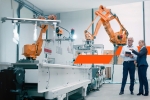Productivity gains over radical change
Irish businesses are embracing artificial intelligence (AI) with cautious optimism, prioritising productivity gains over radical transformation. While the promise of AI looms large, the current trajectory suggests a pragmatic, incremental approach — one that favours operational efficiency over sweeping reinvention.

According to PwC’s 2025 GenAI Business Leaders Survey, 86% of Irish business leaders believe AI will positively impact the national economy within five years. More than half anticipate significant or transformative effects on their own operations. Yet, the dominant focus remains on improving how work gets done, not on reimagining what work is.
This emphasis on productivity is reflected in the numbers: 82% of respondents expect AI to significantly enhance employee time efficiency, and 71% foresee changes in how their organisations create, deliver and capture value within three years. Already, 40% of companies report operational efficiency gains — up from just 26% in mid-2024.
The profitability paradox
Despite widespread enthusiasm, the business case for AI remains elusive. While 94% of Irish chief executives expect to integrate AI within three years, fewer than a quarter can point to meaningful profitability improvements. This disconnect between anticipated efficiency and actual financial impact underscores a critical challenge: moving from experimentation to enterprise-wide value is hard to do.
The survey identifies a lack of clarity around the business case as a key barrier to adoption. Organisations are still learning how to build trust in AI technologies before deploying them for transformative change. Agentic AI systems — capable of autonomous decision-making — may offer a bridge between personal productivity tools and strategic enterprise applications, but confidence in their reliability and governance is still developing.
Skills, not job losses
The human capital implications are profound. Seventy-three per cent of Irish business leaders recognise that AI will require most workers to develop new capabilities. Encouragingly, fears of widespread job displacement are not borne out by the data. PwC’s 2025 Global AI Jobs Barometer shows AI correlates with fourfold productivity growth and wage premiums of 56%, without evidence of net job destruction.
Rather than replacing workers, AI is enabling them to focus on higher-value, creative and strategic tasks. It is amplifying expertise across organisations and streamlining functions from IT and HR to supply chain and marketing. Real-time insights are improving decision-making, while automation is freeing human talent for more impactful work.
Governance: a work in progress
Trust and governance remain underdeveloped. Only 21% of organisations have formal AI governance structures in place, and 69% of business leaders do not believe AI will enhance shareholder trust in the coming year. Yet there is strong support for regulation: 86% welcome the EU AI Act as a necessary safeguard against potential harms.
Risk management concerns are widespread. Eighty-one per cent of respondents expect AI to increase cybersecurity risks over the next 12 months. Legal liabilities, reputational risks and misinformation are also top of mind, with 67%, 60% and 60% of leaders respectively anticipating greater exposure.
From experimentation to impact
Despite these challenges, practical applications are already delivering tangible benefits. In HR, AI agents are streamlining onboarding across departments. IT operations are seeing gains through automated password resets, licence optimisation and security monitoring. Financial services firms report improved fraud detection, while customer service teams are reducing costs and enhancing experiences through AI-augmented interactions.
Healthcare providers are using AI to optimise appointment scheduling and diagnostics, cutting wait times and improving resource use. Consumer goods companies are accelerating content creation and campaign personalisation at scale.
These examples suggest that Irish firms are laying the groundwork for broader AI adoption. Through experimentation, skills investment and gradual trust-building, they are positioning themselves for more transformative applications as technologies mature and governance frameworks solidify.
The road to AI-driven reinvention may be longer than anticipated, but Irish businesses are moving forward — one efficient step at a time.








Menu